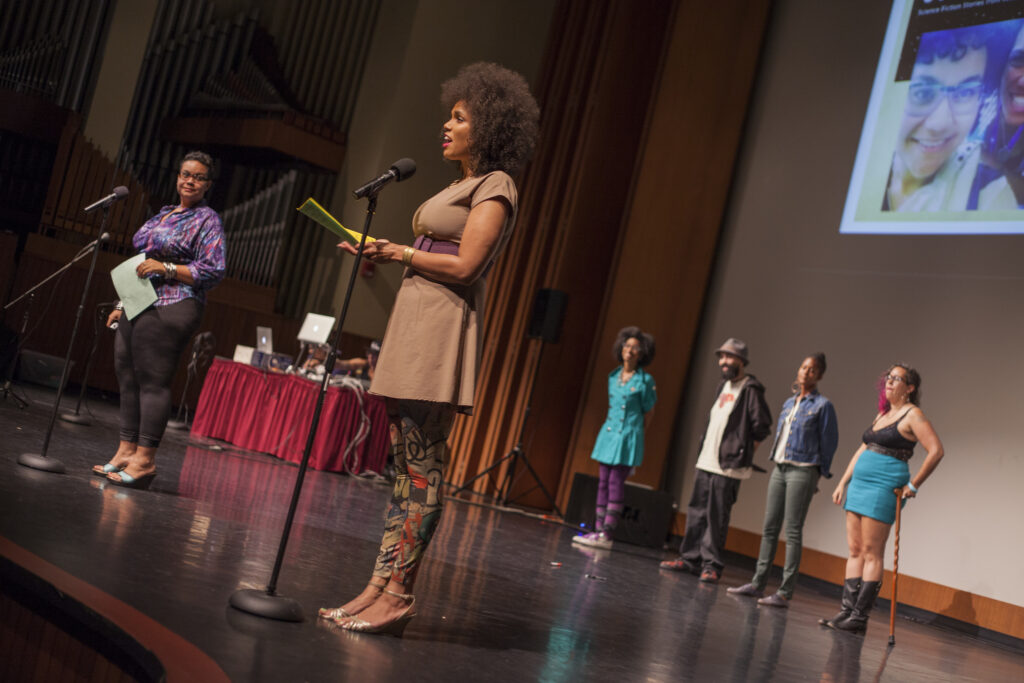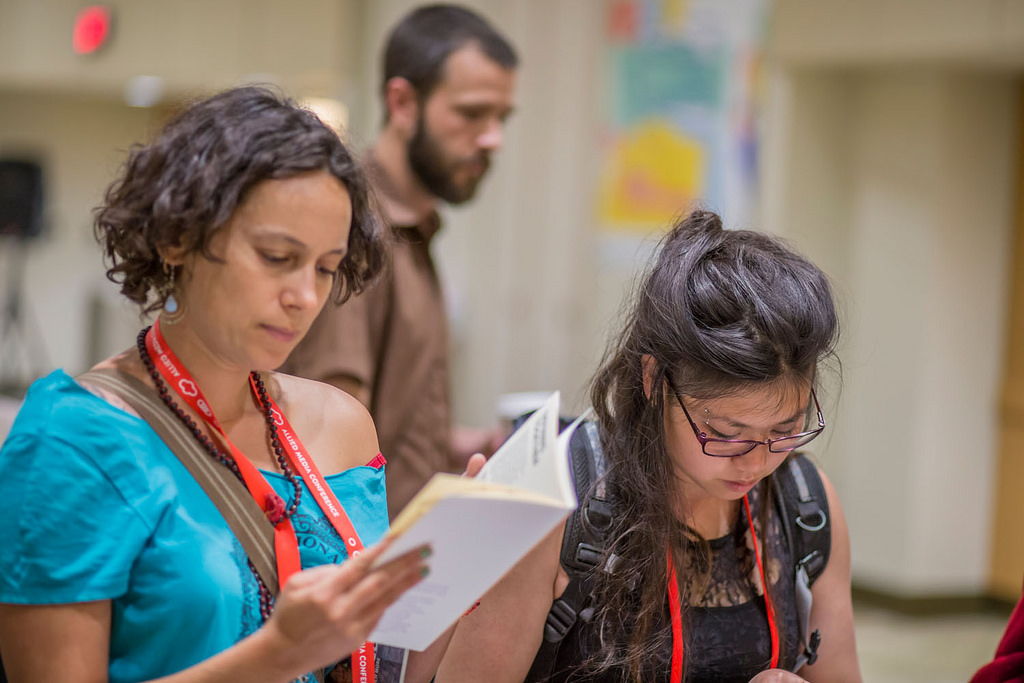Six Reasons You Should Propose a Track, Practice Space or Network Gathering for AMC2017
Words by Allied Media Conference
We are accepting proposals for tracks, practice spaces, and network gatherings for the 19th annual Allied Media Conference, June 15-18, 2017. Held every summer in Detroit, the conference brings together a vibrant and diverse community of people using media to incite change, and features over 300 hands-on workshops, meetups, nighttime events and more.
The Allied Media Conference is a collaboratively designed event. Last year, over 100 coordinators from around the continent organized 27 tracks, practice spaces, and network gatherings at the AMC. We are excited to open our proposal process to new and returning AMCers who will build an even more dynamic and diverse AMC2017.
Here are six reasons why you should propose a track, practice space, or network gathering for this year’s conference! The deadline to propose is November 7.

1. The AMC is an exciting and accessible space for people to come together for a shared purpose.
The AMC’s tracks, practice spaces, and network gatherings are a space to explore, practice and strategize about a cause or topic important to you. Many social justice campaigns have been launched or convened at the AMC, from Black Lives Matter, which held its first national convening of 26 state chapters at AMC2016, to Complex Movements, a Detroit-based multimedia artist collective that has grown a national network through gatherings at the AMC.
“Working as a track coordinator was an a-ma-zing culmination of years of organizing and community work. I connected with people from so many different areas of my life and work! It was truly thrilling and inspiring.”
AMC2016 Coordinator

2. By participating in a year-round organizing process with the AMC, you will form lasting relationships.
Through the three day AMC Coordinators Retreat in January, meet-ups and fundraisers throughout the year, and the conference in June, AMC coordinators build strong connections and a basis for ongoing collaboration beyond the conference.
“I met people who are doing incredible work in libraries with restorative justice, creating spaces that center qtpoc, and people that are interested in continuing the presence of Radical Librarianship at the AMC.”
AMC2016 Coordinator
“Some of the producers and DJ’s I met blew my mind. Klevah and Truth are emcees that I want to know forever and so many academics, whom I have never met, were with us. Meeting practitioners and academics helped me.”
AMC2016 Coordinator

3. Develop projects that extend beyond the conference.
In past years, conference coordinators have gone on to facilitate workshops together after the AMC, launch new projects and publications based off their experience at the AMC, and organize separate conferences and convenings outside of the AMC. Some examples of projects that have been seeded at the AMC are:
- Octavia’s Brood, an anthology of radical science and speculative fiction written by organizers and activists and released in 2015;
- The Detroit Digital Justice Coalition, which launched a three year multimedia education program that trained hundreds of Detroiters.
- The Black Survival Mixtape, which evolved from a session at AMC2015, to a track at AMC2016, and a community festival that was recently named as finalist in the 2016 Knight Arts Challenge.

4. Grow your skills as a facilitator, trainer and fundraiser with support from experienced AMP staff and the peer network of AMC coordinators.
At the AMC Coordinators Retreat in January, you will have focused time to explore content development, fundraising and communications as it relates to your track, practice space or network gathering. You will also receive the How We Organize the AMC zine and the Presenter Guidelines zine, which offer tools and resources that can inform your work beyond the AMC.
“The coordinator’s meeting was super helpful in understanding logistics and building connections with other coordinators and identifying opportunities for collaboration / cross-pollination.”
AMC2016 Coordinator

5. Learn about and grow your practice of media-based organizing.
Media-based organizing is at the heart of the content at the AMC. We define media-based organizing as any collaborative process that uses media, art, or technology to address the roots of problems and advances holistic solutions towards a more just and creative world. Through your experience as a coordinator, you will learn about different media-based organizing approaches and better understand how you can implement this framework in your own work going forward.
“Building my understanding of media-based organizing is a continuing process for me. For the first time this AMC, I identified as a community organizer. I have learned so much by being involved in the participatory organizing process and connecting with other folks doing media-based organizing in all sorts of fields to address all sorts of social issues.”
AMC2016 Coordinator
“The diversity of proposals that we reviewed helped to open my mind to different ways that folks understand media-based organizing.” – AMC2016 Coordinator
AMC2016 Coordinator
“Previously I was focused on using design to support movements; now I’m also focused on organizing designers who are supporting movements.”

6. Access scholarships and financial support.
You will receive a complimentary registration, housing support, and a mini-grant to seed grassroots fundraising efforts for your TPSNG. In addition to these resources, AMC staff will advise on the development of vision and content of tracks, network gatherings, and practice spaces and facilitate connections between coordinators, potential participants and potential funders. We want to help make this experience as impactful as possible for both AMC participants and coordinators!
Ready to propose a track, practice space, or network gathering for AMC2017? Click the button below to get started!
All photos by Ara Howrani.